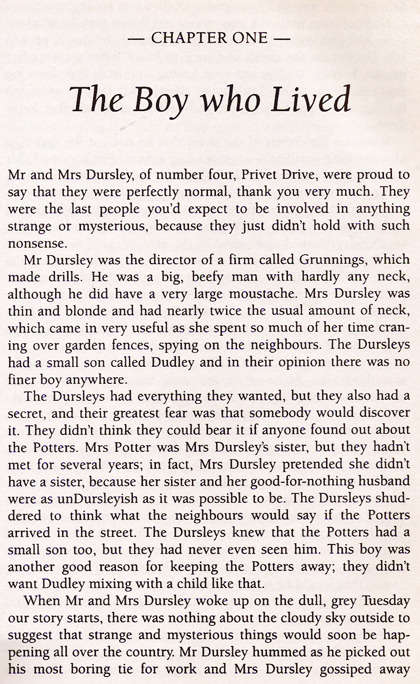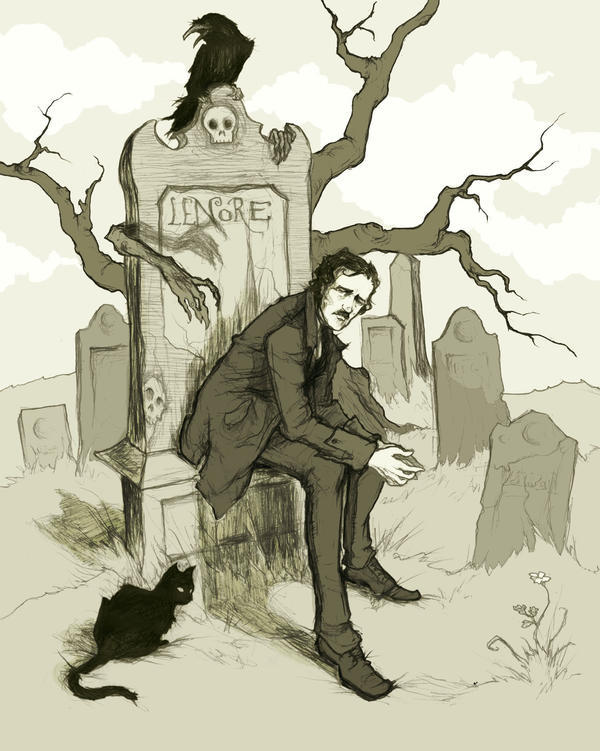Of Readers and Reviews
Find your favourite first page. Think about why it's your favourite. What about it captures your attention?
Is it the first line? The first paragraph? Is it the tone or an image that it creates? Think about the feeling that page evokes in you and see if you can identify what makes you love it.
Is it the first line? The first paragraph? Is it the tone or an image that it creates? Think about the feeling that page evokes in you and see if you can identify what makes you love it.
For many twenty-somethings like me, the page above was the first page of our lives. I was seven when the first book was published, eight when I read them, eleven when I realised that I was doomed to muggledom and seventeen when I did my maths coursework on 'How Eponymous is Harry Potter?' I, along with millions of other youngsters-turned-teens-turned-young-adults, listened to the lovely voice of Stephen Fry every night, and in my case The Prisoner of Azkaban all the way to Scotland and back. Similarly, I was one of those lined up in Tesco at midnight after a Shakira concert in my fervour for Book Four, then again for Five, Six and even dressed up in full wizarding garb for book Seven. I have all the receipts for the books tucked into a scrap book and I found a letter my cousin and I stowed in an empty shampoo bottle, asking Sirius Black to save us from Voldemort and telling him that He-Who-Must-Not-Be-Named had shrunk Harry Potter into a dolls house.
Some say JK.Rowling cast a spell over a generation - our generation - but it's more like she overwhelmed us with the magic of her writing. As you can probably tell from the shampoo-bottle-letter, she inspired us and begged us to use the imaginations that other books failed to encourage. That's not to say that all over books failed, far from it, but something special happened on that train when JK scribbled her first words onto the billion-pound-napkin. The origins are described as if some strange spirit dubbed Rowling worthy and she claims that:
"I had been writing almost continuously since the age of six but I had never been so excited about an idea before. I simply sat and thought, for four (delayed train) hours, and all the details bubbled up in my brain, and this scrawny, black-haired, bespectacled boy who did not know he was a wizard became more and more real to me."
There are a couple of things that we then have to think about - she wasn't given a book deal immediately, it was a long hard slog and a lot of determination that finally succeeded in putting Harry Potter on book shelves everywhere. Similarly, Harry Potter was begun in 1990 (the year I was born) and it took seven years before the first one was in print. If there's ever a story about 'Don't-Give-Up' when it comes to writing, it has to be this one.
Did you know that those opening pages were dismissed again and again for 'telling instead of showing', the Dickensian style caricatures that describe the despicable Dursley household, the Dahlian morbidity of Harry's dire, neglected childhood - there's something about these that capture our imaginations, taking us back to the way we read when we weren't too old to walk through the children's section of Waterstones without feeling awkward. I think it's important to think about those first pages, those things that draw us in and make us believers despite the surreality of the content. I think it's important for any writer to know what appealed to them and thus what might appeal to others. It's your first impression, the quickest way to your audience. So spend a little time thinking about what OTHER writers do instead of just focusing on you. Furthermore, to mention briefly the 'review' part of this post: listen to what others say and don't take affront when someone offers you criticism. Yes - JKRowling was lucky and she powered through the years of refusal but a child read that book and it was published and look at it now - it's a perfect hollywood tale. However, you're not JKRowling yet (unless you are but that's another story) and you still should listen to what others make of your work. The world is at the tip of your pen, don't scribble all over it just because you can.
Je serai poète et toi poésie,
SCRIBBLER





.jpg)

